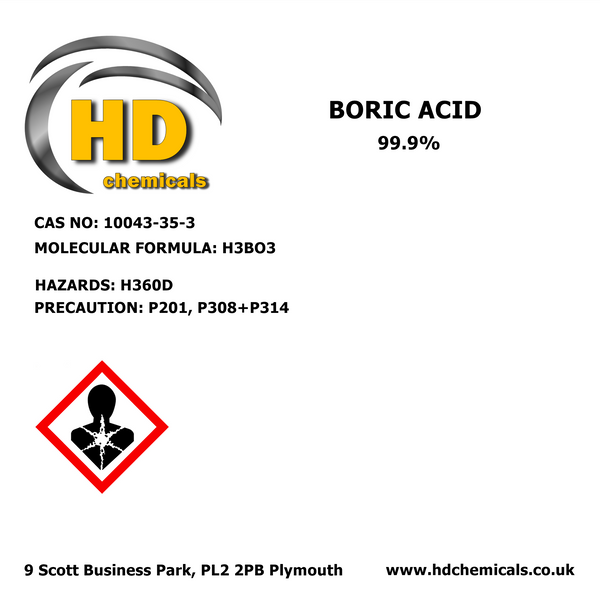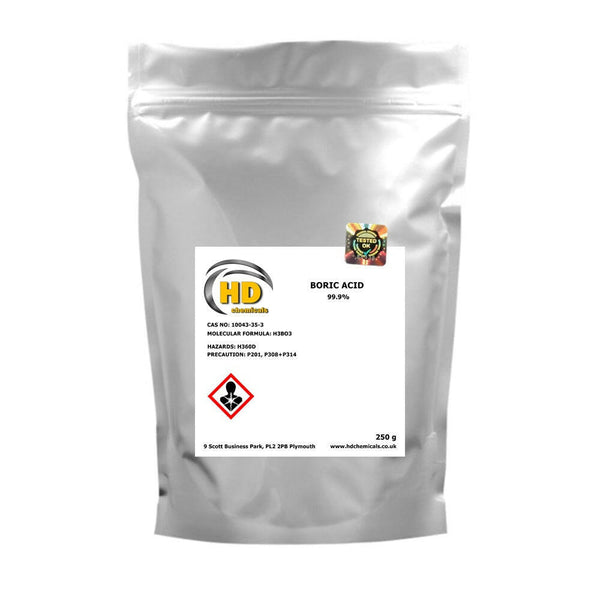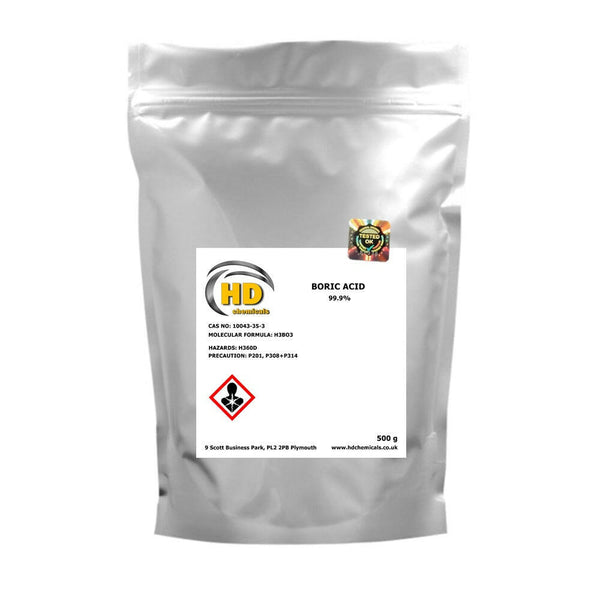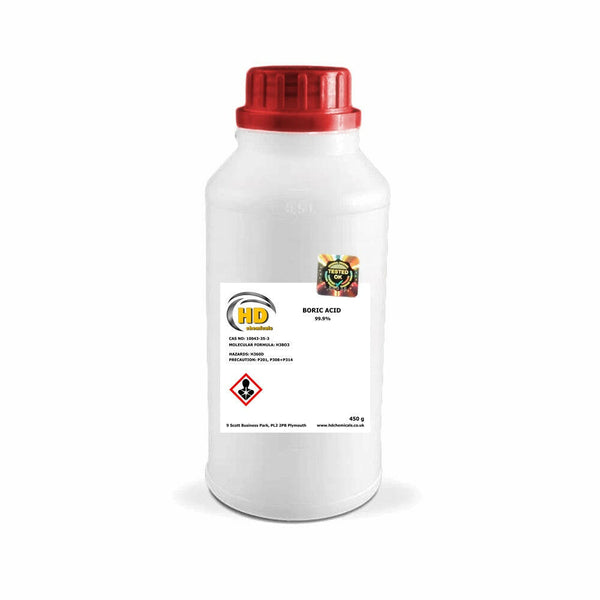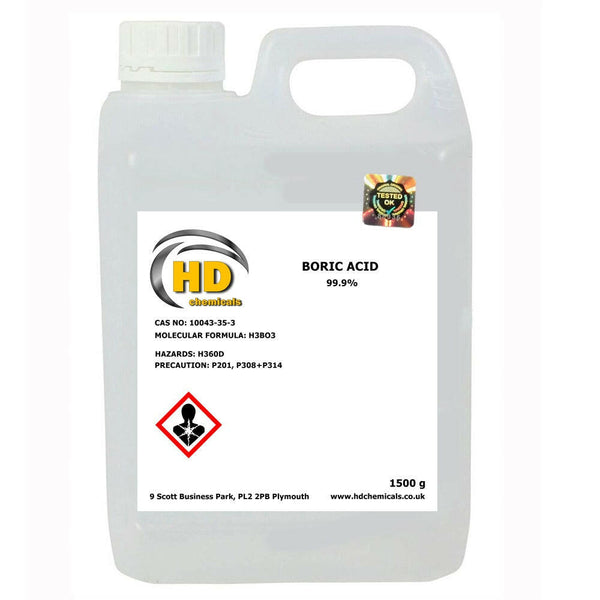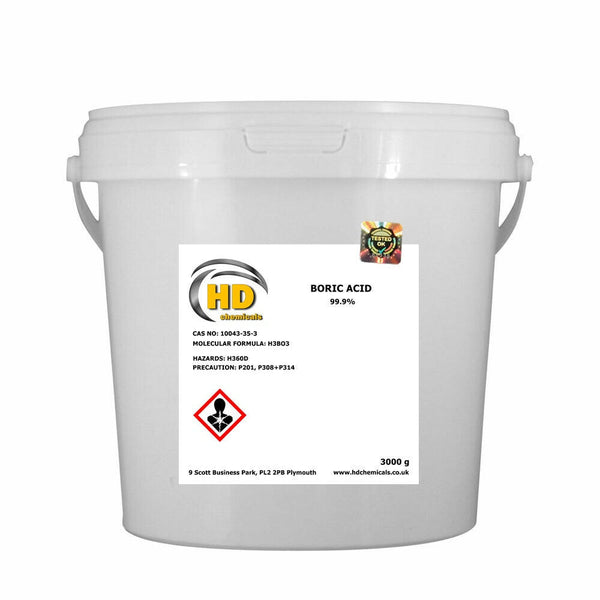Boric Acid 99.9%
BORIC ACID 99.9% available in 250g, 450g, 500g, 1500g, 3000g.
POWDER FORM
TECHNICAL GRADE
Buy 1 item get 1 at 10% off
Boric acid is a water-soluble chemical compound that consists of oxygen, boron, and hydrogen. Boric acid goes by several names, including hydrogen borate, boracic acid, and orthoboric acid. Boric acid exists in the form of colourless crystals or a white powder that dissolves in water. Some of its uses include antiseptic, insecticide, flame retardant, or precursor to other chemical compounds. One can use boric acid with other minerals such as borax and boracite. When this occurs in the mineral state, it is known as sassolite.
There are many boric acid household uses when used independently or when combined with other chemicals. Due to its reduced toxicity, the acid is easy to use for domestic purposes. Boric acid is naturally present in vegetables, most fruits, grains, and nuts. It is also found in seawater and green plants. Yet, we cannot tell their presence in our food because boric acid crystals are odourless and essentially tasteless. It is not poisonous in small amounts that occur in nature. However, boric acid is harmful if swallowed or inhaled in large quantities.
What Are The Uses Of Boric Acid?
Boric acid is usable across many fields in various forms. It has both antifungal and antiviral properties. Hence, it is ideal for treating several infections. The medical field widely utilizes boric acid as an antiseptic. Its most common usage includes its usage in cosmetics, cleaning products, pesticides and insecticides, preservatives, and lubricants. Other common uses include in nuclear power plants, in many manufacturing industries, and also in pyrotechnics. Despite the many ways that one can use boric acid in homes, its use as an antiseptic, insecticide, and cleaning agent is most common.
As an antiseptic, boric acid, when mixed with distilled water, serves as a wound spray. The acid can treat minor cuts and burns. Manufacturers also use it in making salves and dressings such as boracic lint. One is advised not to use it too frequently. Boric acid is safe to use in households to control cockroaches, fire ants, termites, and other insects. Its first use in the United States as an insecticide was in 1948.
When these pests come into contact with the boric acid powder, whether through a trap or through walking across a thin layer of it, it sticks to their bodies, and they ingest it while cleaning themselves. The acid consequently poisons their stomachs, affecting their metabolism and resulting in the abrasion of their exoskeletons. Boric acid naturally contains some cleaning properties and is gentle enough to be a component in some baby laundry detergents. It also appears in other cleaning products, such as glass cleaning products. It is added to regular detergent to get rid of tough stains on clothes.
From glass-reinforced plastics on boats to food preservation, boric acid is easy to find everywhere. And the UK is no exception. So if you live in the UK and are wondering where to buy boric acid, you can easily find it here. The sizes are available in 250g, 450g, 500g, 1.5kg and 3kg options. Making it perfect for single home use or tasks requiring a larger quantity of boric acid.
How To Use Boric Acid In The House
Thanks to its versatile and less toxic nature, boric acid can be used for household and industrial purposes. The following are some of the ways to use boric acid in the home.
As an Eyewash
Boric acid is often present as an ingredient in eyewash solutions. Boric acid has mild antibacterial and antifungal properties. Thus it can help slow or prevent the growth of bacteria or fungi in the eye. Boric acid also serves as a buffering agent, maintaining the pH level of eyewash solutions. It is important to note that boric acid eyewashes can only treat mild eye irritations. You should consult a doctor if you're experiencing severe irritations.
In Treating Ear Infections
Boric acid is also helpful in treating various types of ear infections in both humans and pets (otitis externa), also called swimmers ear, is an infection of the outer ear canal. The use of boric acid powder is recommended in its treatment as it discourages the growth of bacteria and fungi. The use of boric acid in children is not advisable.
In Treating Yeast Infections
For people dealing with recurrent or chronic yeast infections, boric acid is a treatment worth investigating. Other health benefits of boric powder include bone strength and anti-arthritic benefits. You can also use boric acid powder to treat small wounds and injuries indoors. In hospitals, boric acid is mixed with other agents to reduce the risk of getting your wound infected.
In Preserving Furniture
Boric acid inhibits the growth of fungus, thereby preserving furniture. It protects furniture from bugs, insects, and termites that may invade them. The acid is used in combination with an ethylene glycol carrier to treat wood against fungal and insect attacks. It is possible to buy borate-impregnated rods for insertion into wood via drill holes where moisture is known to collect and sit. It is available in a gel form and injectable paste form for treating rot-affected wood without replacing the timber. Due to its flame-retardant properties, furniture makers use it in manufacturing furnishings, mattresses, and insulation. In addition, the acid powder is effective in cleaning flea-infested carpets and eliminating bugs and roaches.
In Treating Athlete’s Foot
The boric acid powder is also helpful in treating fungal infections, such as athlete’s foot and toenail fungus. A few sprinkles of boric acid powder in your socks or stockings can help treat and ease the itching associated with having an athlete’s foot. The acid powder can also neutralize the foot odour from the athlete’s foot infection, providing relief for smelly feet as the acid changes the pH and helps remove dead skin that feeds the fungus. Boric acid is a potent fungicide, and it often clears up athlete’s foot in cases where antifungal creams have failed.
In Pool Maintenance
Boric acid comes in handy in maintaining swimming pools. It helps with stabilizing the pH level of the water and prevents problems with algae. Using the acid decreases the amount of chlorine you need in the pool. Boric acid keeps the water clear and sparkling while eliminating fungi in the water. If you find yourself asking where can I buy boric acid in larger quantities? Then a great place to shop boric acid powder in the UK with various bulk size options is here. It is convenient for use in commercial ventures such as fumigation, pool cleaning, or furniture making.
Industrial Uses Of Boric Acid
just as it is functional in the home, boric acid comes in handy in industries and factories. Its usability is pronounced in several industrial processes such as;
- The production of cleaning agents, sealants and lubricants. It is also used in textile and heat transfer products.
- Boric acid is an essential component in manufacturing cosmetic products. When mixed with silicon oil, boric acid may provide an alternative to rubber.
- As a flame retardant, boric acid features in many wooden and fibreglass doors or walls, making them less susceptible to fire.
- Boric acid is useful for the storage and preservation of agricultural products such as wheat and rice.
The uses highlighted above are some of the everyday uses of boric acid. The potential of this multi-purpose acid exceeds the unassuming package it comes in. When you buy boric acid UK, you’re investing in a priceless product. Boric acid may be used in both domestic and industrial settings, an unrivalled versatility. It is also used in hospitals, pharmaceuticals, nuclear plants and pyrotechnics. Boric acid can be found in several everyday life items, either in the production stage or as the finished product.
Molecular Formula: H3BO3
Buyer assumes all responsibility for safety and use not in accordance with directions.







